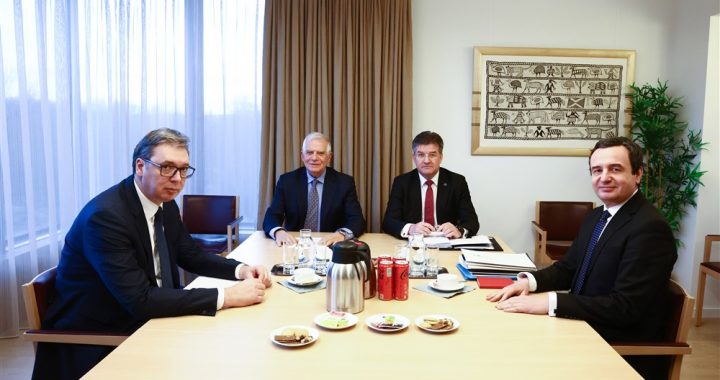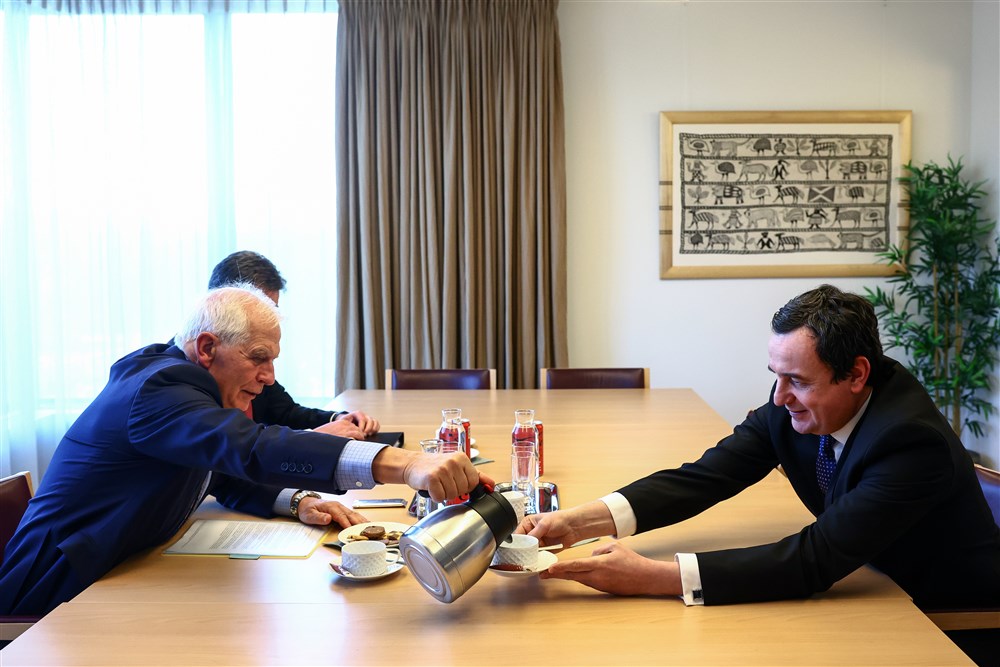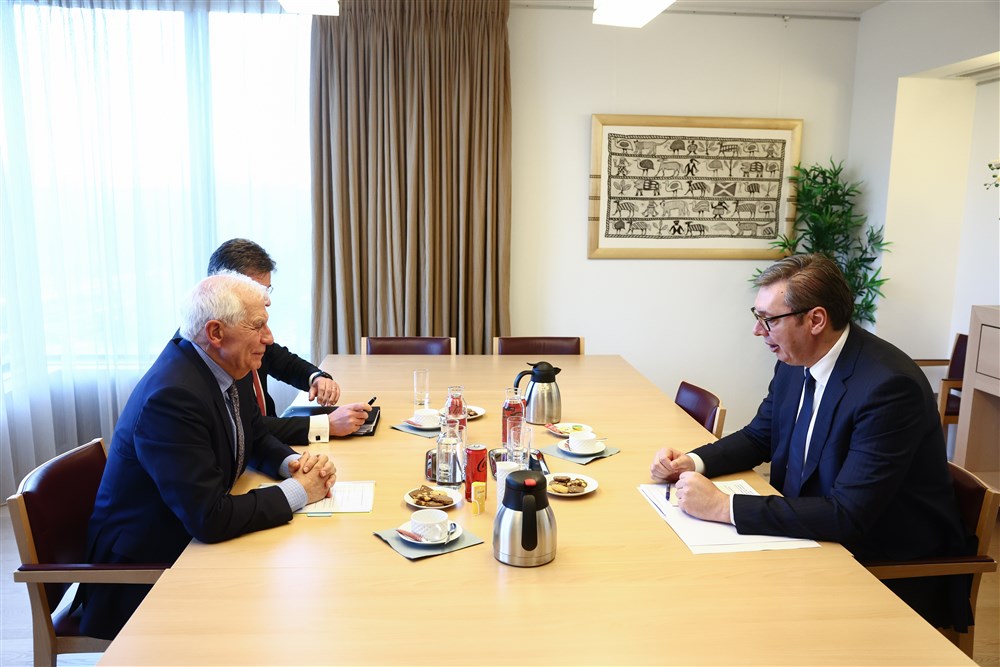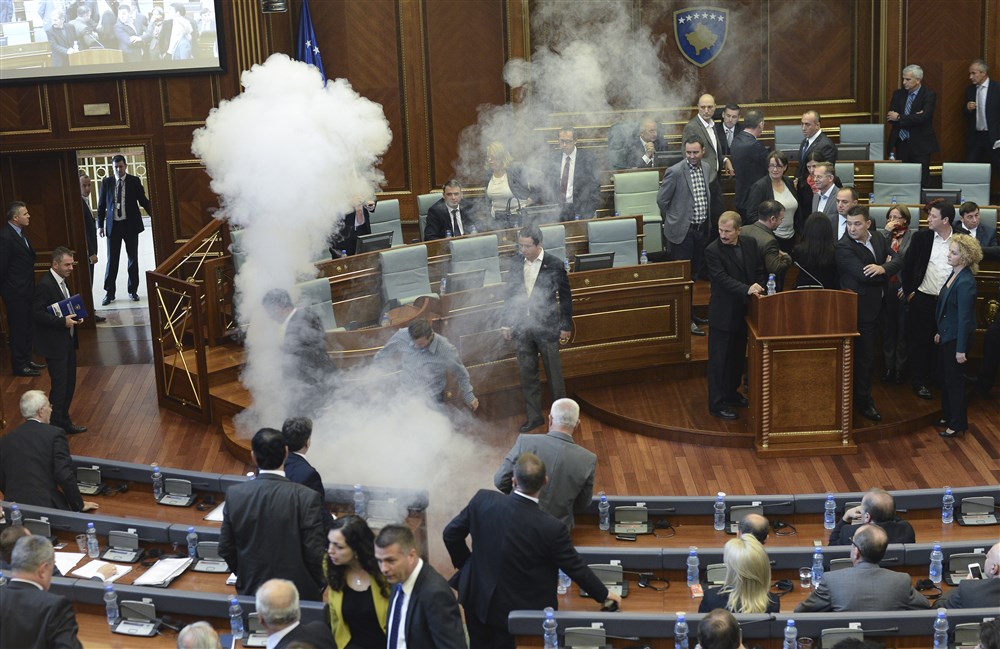

 Serbia's President Aleksandar Vucic (L), High Representative of the European Union for Foreign Affairs and Security Policy Josep Borrell (2-L) and Kosovo's Prime Minister Albin Kurti (R) at the start of a trilateral meeting for an EU-Belgrade-Pristina Dialogue at EEAS building in Brussels, Belgium, 27 February 2023. Photo: EPA-EFE/STEPHANIE LECOCQ
Serbia's President Aleksandar Vucic (L), High Representative of the European Union for Foreign Affairs and Security Policy Josep Borrell (2-L) and Kosovo's Prime Minister Albin Kurti (R) at the start of a trilateral meeting for an EU-Belgrade-Pristina Dialogue at EEAS building in Brussels, Belgium, 27 February 2023. Photo: EPA-EFE/STEPHANIE LECOCQ
After a several-hour meeting in Brussels between Kosovo Prime Minister Albin Kurti and Serbian President Aleksandar Vucic, no agreement was signed, though both sides reportedly agreed to the EU proposal.
The tripartite meeting that was expected to bring signatures to the EU proposal for the normalization of relations between Kosovo and Serbia ended in Brussels without a signed final agreement.
However, the High Representative of the European Union, Josep Borrell, stated that Kosovo PM Albin Kurti and Serbian President Aleksandar Vucic, had agreed on the EU proposal, and there was no need for further discussions on that.
“I am pleased to announce that President Vucic and Prime Minister Kurti have today agreed that no further discussions are needed for the European Union Proposal, the proposal that had the title ‘Agreement on the Paths to Normalization Kosovo and Serbia’. And they both disagreed that no more discussions were needed,” Borrel told a press conference.
Borrel said more negotiations were needed to determine the specific implementation of the modalities, and in the middle of March the EU emissary, Miroslav Lajcak, will visit Kosovo and Serbia.
“They [the two leaders] show readiness but further negotiations are needed for models. I will call another meeting of leaders during March with both leaders for the implementation of the annex; this is part of the agreement and must be finalized. The EU has reminded partners of their obligations to implement all agreements. In the middle of March, the special representative of the EU will visit Kosovo and Serbia to get the answers for the next meeting,” Borrell said.
After the meeting, Kurti said that the meeting had been confirmation that the EU proposal is acceptable and unchangeable, but that Vucic was not ready to sign it.
“I have said earlier that it is a good basis for further discussions and it is a solid platform to move forward and now the further discussions, moving forward, will be about the implementation plan for which there will be shuttle diplomacy,” Kurti said.
“I expressed my willingness to sign it [the agreement] but the other party was not ready to sign it. I think it’s a pity that it wasn’t signed because we agreed [on the proposal]. But it was the Serbian side that did not do it, even though we agreed,” Kurti added.
President Vucic told the media that Kurti had not accepted the Association of Municipalities with a Serbian majority.
Vucic said a meeting is expected on March 18, which will take place in North Macedonia. “It was a difficult meeting and I believe that there will be many new meetings. Maybe we will see each other in North Macedonia, Borrell will visit the region and we will talk about things for implementation. Of course, it will be about implementation of all preliminary agreements. Kurti is not ready to accept the [municipal] Association; if he is ready to accept it in future, we will see, but I am afraid that we will stay on this matter,” declared Vucic.
Kosovo’s PM, Albin Kurti, and Serbia’s President, Aleksandar Vucic, started the EU-facilitated meeting in Brussels, on Monday, mediated by EU High Representative Josep Borrell and the EU Special Representative, Mirosllav Lajcak.
“On the agenda: the EU proposal on normalisation of relations. I hope for a constructive approach by the two parties”, tweeted Borrell ahead of the meeting on Monday.
Both Kosovo and Serbia have said “yes” and were expected to sign the EU proposal for the normalization of relations between the countries. With its signature, Kosovo was expected also to accept the establishment of the Association of Serb-majority Municipalities, while Serbia was expected to de facto recognise Kosovo.


Western support ahead of the meeting
Ahead of the meeting, both Kosovo and Serbia received messages of support from the US and the EU countries regarding the agreement.
French President Emmanuel Macron, German Chancellor Olaf Scholz and Italian Prime Minister Giorgia Meloni sent letters to Kurti and Vucic the weekend before the meeting. While Vucic did not publish the content of the letter, the one sent to Kurti included a welcome to his decision to accept the EU proposal and a reminder to start implementing the previously signed agreements, specifically the one on the Association.
Senior US State Department advisor Derek Chollet met both leaders the weekend ahead of the meeting. He assured Kurti and Vucic in separate meetings that the US fully supports the EU’s proposal for the normalization of relations between Prishtina and Belgrade and that both parties should start implementing agreements they have signed.
Spoke with President Vucic @predsednikrs today to express strong U.S. support for the February 27 meeting with EU HR/VP Borrell in Brussels. Welcomed Serbia’s continued commitment to constructive engagement on the EU proposal for securing peace and stability in the region.
— Derek Chollet (@CounselorDOS) February 26, 2023
Spoke with PM @albinkurti today ahead of the EU-facilitated Dialogue leaders’ meeting to advance normalization of relations between Serbia and Kosovo. The U.S. supports a constructive meeting that affirms both parties’ commitment to the EU proposal.
— Derek Chollet (@CounselorDOS) February 25, 2023
The EU proposal was also supported collectively by the countries of the European bloc at their last meeting of the European Council.
Opposition in Kosovo remains skeptical
Meanwhile, the opposition in Kosovo said it did not expect any final agreement at the February 27 meeting, as long as there is no mutual recognition.
The chairperson of the Democratic Party of Kosovo, Memli Krasniqi, said that there will be no comprehensive final agreement between Kosovo and Serbia with mutual recognition at the center, and this will no longer be a topic of discussion.
The chairperson of the Democratic League of Kosovo, Lumir Abdixhiku, said that the final agreement should basically involve mutual recognition between the two countries.
Background from 2013 onwards
The Franco-German proposal, or as it has recently been rebranded, the EU proposal, has never been made public, but has been leaked by Euractiv.
The plan is thought to set a path towards a final agreement between Kosovo and Serbia.
Kosovo and Serbia reached an agreement on the Association of Municipalities in 2013 in Brussels.
In August 2015, as a part of the same dialogue, the prime ministers of Kosovo and Serbia agreed on the content – or Principles – of implementing legislation for the creation of the Association agreed in 2013.
But this second agreement was strongly rejected by the then opposition in Kosovo because it unveiled an intention to create an independent governing institution only for Serbs. This was considered as going against the constitutional concept of multi-ethnicity and as a threat to Kosovo’s sovereignty.
This is when the pictures of Molotov cocktails started appearing all over international media. The opposition said that the 2015 agreement was unconstitutional and demanded that the then Government withdraw from it.
Kurti’s now governing party, Vetëvendosje, then in opposition, organized street protests and blocked the work of the parliament by setting off tear gas.

Kosovo and Serbia started negotiations mediated by the European Union in 2011. During this time, some 33 agreements were signed, but not all of them were implemented.
*This text has been updated on 27 February 2023, at 21:35, to include the informations about the outcome of the meeting in Brussels.
27 February 2023 - 19:38

On visits to Belgrade and Prishtina, High Representative Kaja Kallas w...

Kosovo is calling for justice for Albanian soldiers murdered while ser...

After the February 2025 parliamentary elections, Kosovo finds itself i...

European Union High Representative for Foreign Affairs, Kaja Kallas, d...
Lorem ipsum dolor sit amet, consectetur adipisicing elit. Optio, possimus obcaecati repellendus minus ut voluptatum laboriosam, neque fuga velit! Asperiores sint facere accusamus. Enim, omnis vero magnam beatae tenetur, et, architecto aliquid neque facilis itaque doloremque maxime sit. Alias sapiente ab odio corrupti reprehenderit beatae eius quis tempora, perspiciatis obcaecati culpa debitis molestias, officiis, nulla iste delectus tenetur sunt dolorem ea perferendis laboriosam, praesentium voluptatibus velit atque sint. Eligendi deserunt fugiat molestiae ex, animi, libero asperiores quis perferendis vero quibusdam, inventore dicta optio minus fuga reprehenderit officia quas dolorum error amet aliquid. Aut, non mollitia, corrupti nesciunt fuga vel hic.